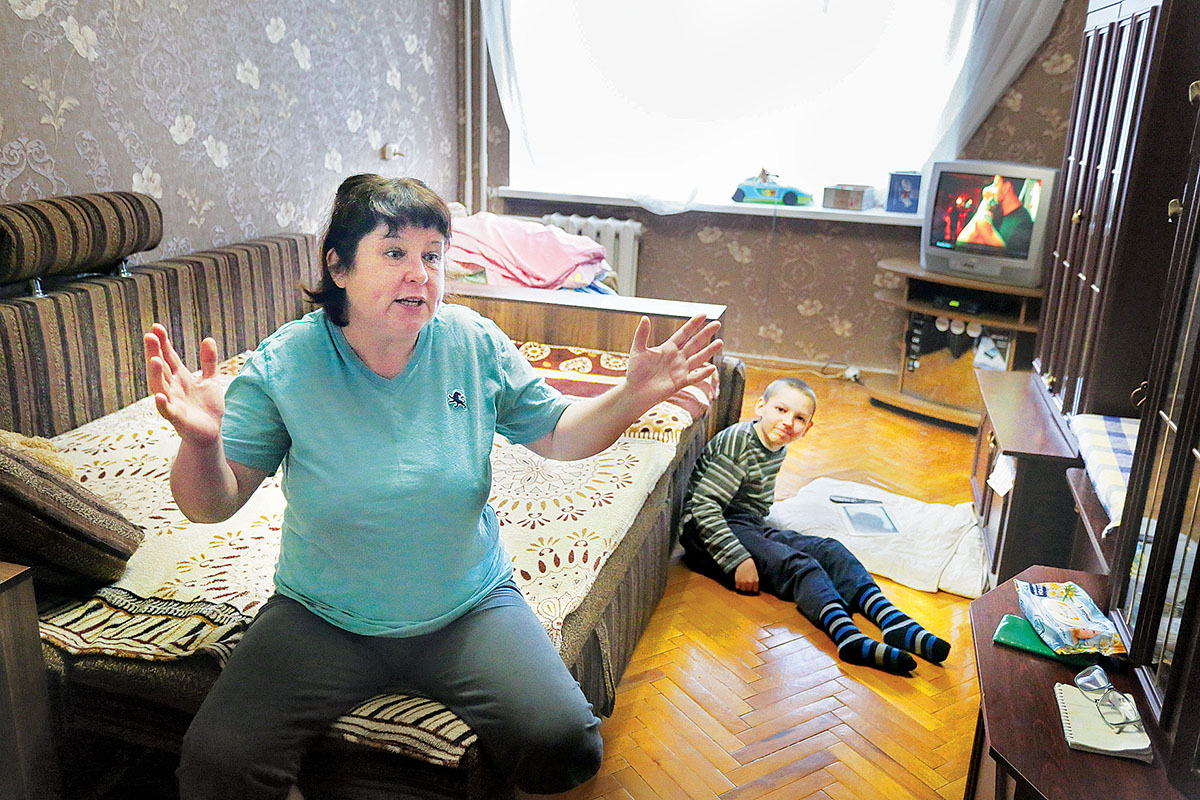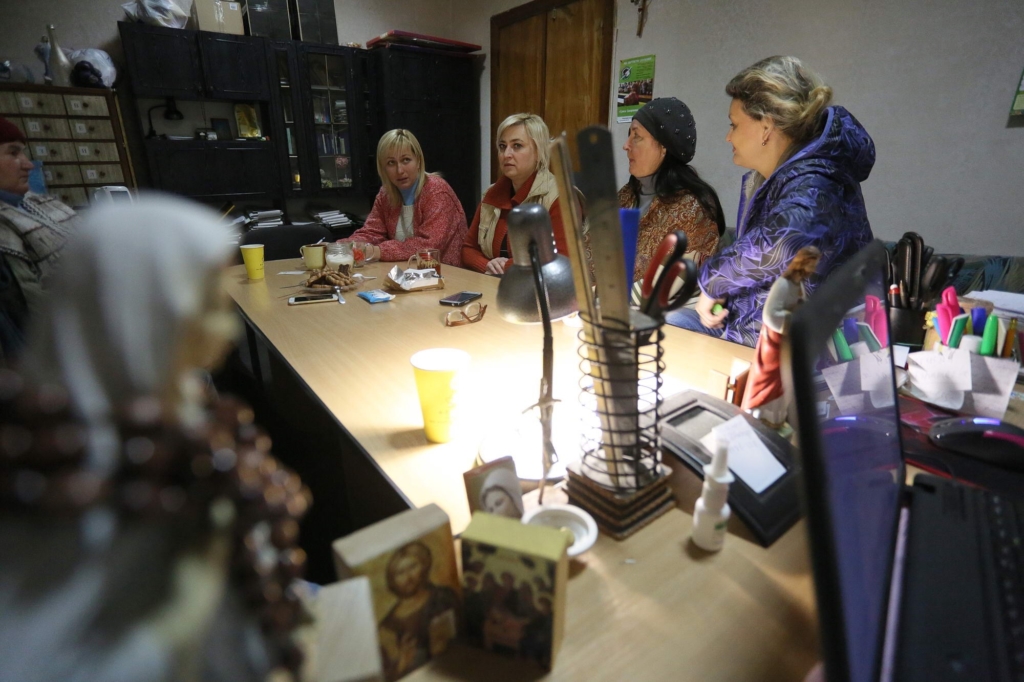BERDYANSK, Ukraine — Larysa Chudnenko always dreamed about living near the sea. But it was a nightmare that brought her there.
Chudnenko spent most of her life in Yenakiieve, an eastern industrial city of 80,000 people, famous as the hometown of disgraced ex-President Viktor Yanukovych, who was ousted by the EuroMaidan Revolution in 2014. There, Chudnenko lived with her 9-year-old grandson Oleksiy, who suffers from cerebral palsy. Oleksiy’s mother — Chudnenko’s daughter — left the family after her son was born. The boy’s father is in prison.
“I’m the only one he has,” Chudnenko says of her grandson.
Their quiet life changed forever in the summer of 2014, when their city was taken over by Russian-led fighters. As the Ukrainian military tried to bring the city back under government control, Yenakiieve suddenly became the site of intense fighting. Chudnenko knew she had to get out.
Chudnenko heard that her neighbors were driving to Zaporizhzhya Oblast’s Berdyansk, an Azov Sea resort city 250 kilometers southwest of Yenakiieve, for a seaside holiday. She asked them to take her and her grandson with them for what she expected to be a temporary stay.
Population swells
She – and at least 10,000 others displaced by the war – remain in the city of 115,000 residents, overwhelming Berdyansk at times and leading to volunteer relief projects to welcome and help the internally displaced persons, or IDPs. At the peak, Berdyansk hosted an estimated 22,000 people seeking refugee from war-torn cities. But most have returned home.
Today, Ukraine has 1.7 million registered IDPs, 4 percent of its population. Ukraine has the ninth-largest number of IDPs in the world, according to the United Nations.
Many, like the Chudnenkos, still can’t or won’t go home.
“We thought we’ll just stay here for a couple of weeks, enjoy the sea and we’d return home once it was quiet,” Chudnenko said.
But Chudnenko learned that Russian-led fighters moved into her apartment, as they have done in many abandoned dwellings in Russian-occupied areas.
So Chudnenko and her grandson decided to stay in Berdyansk for good, and applied for aid as internally displaced people.
Help arrives
Chudnenko’s transition to her new refugee status wasn’t easy. She had to register as an IDP, file numerous requests for state aid, and on top of that find accommodation. But help came from where she least expected — her fellow IDPs from the Donbas, who had formed a self-help association called Balto.
Nataliya Shylova, who heads Balto, was a successful businesswoman in Donetsk. She left the war-torn city in 2014 for safety in Berdyansk, where she met the same problems as Chudnenko.
Local officials in Berdyansk were overwhelmed by the number of IDPs arriving in the city, so Shylova took the initiative. She founded a volunteer organization catering to the needs of the IDPs.

Larysa Chudnenko talks about her life in Berdyansk after she relocated there from eastern Ukrainian Yenakiieve with her grandson Oleksiy in summer 2014. Chudnenko’s 9-year-old grandson suffers from cerebral palsy. (Oleg Petrasiuk)
Balto focuses mostly on resolving legal issues and finding accommodation, and it is on a constant hunt for grants to fund its activities. In 2017, the organization launched a new project to provide IDPs with food and sanitary product vouchers, backed by Pope for Ukraine, a special humanitarian initiative by Pope Francis aimed at helping Ukrainians affected by the fighting in the east of the country. More than 500 IDPs have benefited from it.
When Shylova launched Balto, there were just four people on staff — all of them originally from the Donbas. Now they have about 20 members and work with almost 3,000 of the 10,000 IDPs living in Berdyansk.

Nataliya Shylova, (second from left), who heads a volunteer organization in Berdyansk called Balto, talks about problems internally displaced people face. (Oleg Petrasiuk)
Chudnenko has no plans to return to the Donbas and already thinks of her life there as something far in the past.
“I don’t even remember what color the tiles were in my apartment,” she says.
But three years later, her grandson still remembers the shelling vividly.
“Even now, if he hears a loud ‘bang’ he cries and begs me to go to the basement,” Chudnenko says, sitting in the apartment she rents in Berdyansk.
Her grandson plays on the floor beside her.
Finding an apartment suitable for Oleksiy has been the biggest challenge for Chudnenko. They have changed apartments eight times since their initial relocation in 2014 and now rent a one-bedroom apartment on the fourth floor of an apartment block.
“I have to ask the neighbors every time to carry his wheelchair down to the first floor,” she said.
Resort city
Every summer, the seaside resort of Berdyansk attracts up to 1.5 million tourists. But for IDPs like Chudnenko, that’s bad news.
And every summer, local IDPs have to go apartment-hunting as landlords push them out to rent the flats to tourists on a per-day basis — and for a much higher price.
Serhiy Omelyanchik, a retired miner, came to Berdyansk from Makiivka, a small mining town in Donetsk Oblast in 2014. Since then, his family of five had to change apartments seven times.
They now rent part of a house — just two bedrooms and a tiny kitchen — in the outskirts of Berdyansk for Hr 4,500 ($160) a month.
But that’s not the biggest burden on their family budget. Omelyanchik’s 30-year-old daughter suffers from multiple sclerosis, and needs several injections a week, each of them costing Hr 5,600 (around $200).
“I don’t like to complain,” Omelyanchik says. “My son-in-law has a job here. And some organizations, like Balto, help us with food and medication.”
Shylova of Balto says that Omelyanchik’s family has been one of their most difficult cases due to the costly medication they need.
But the activist adds that IDPs are stronger when they stick together.
“IDPs are often considered to be no one,” she says. “But what we can do is help one another. The most important thing is that we’re together – it’s like we’re a little diaspora.
